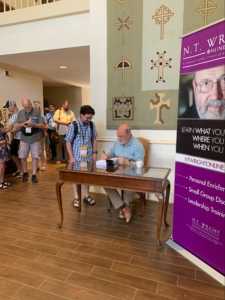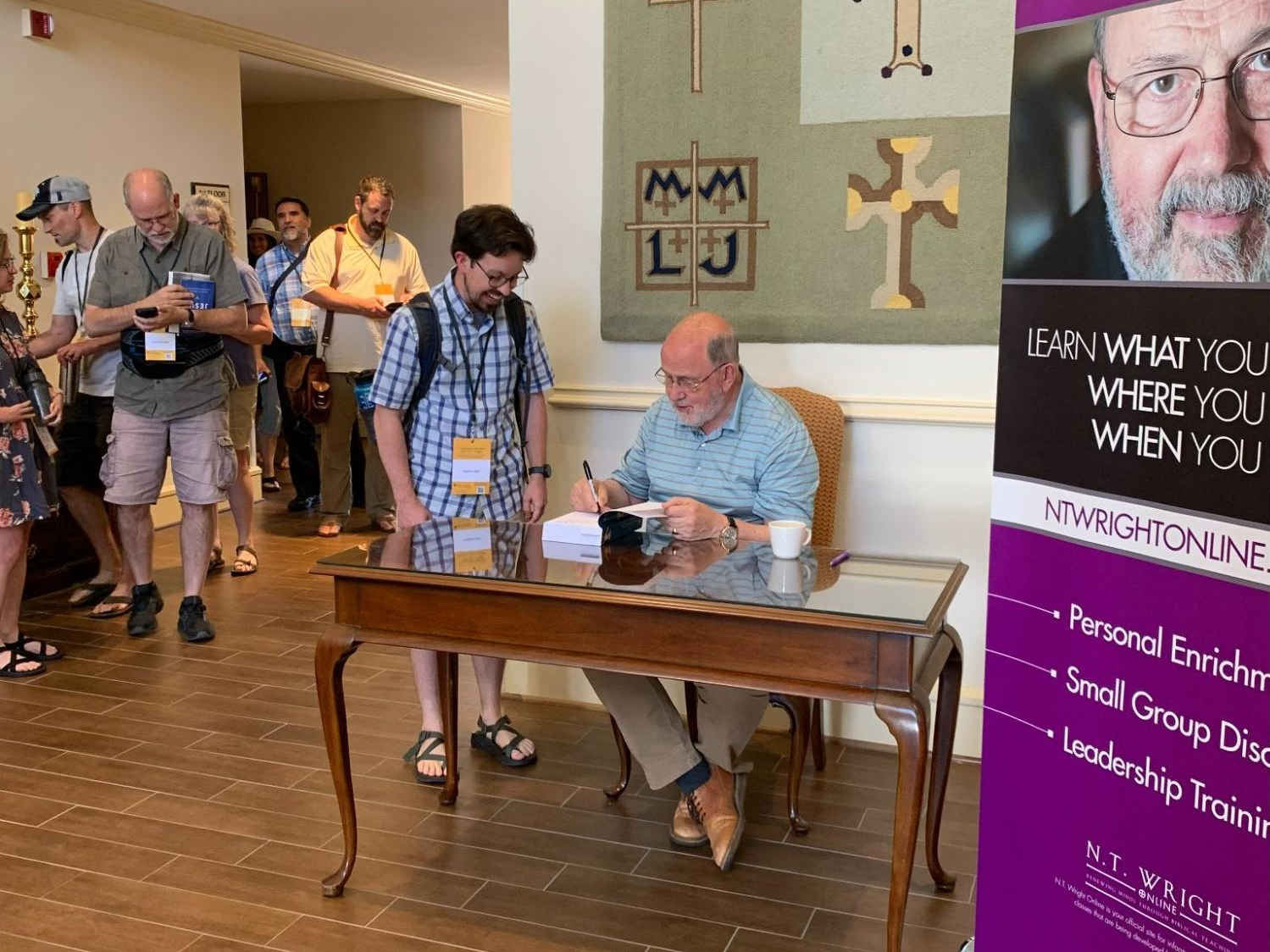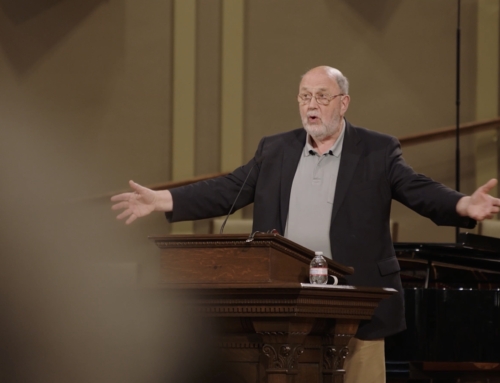To spend a week with Prof. N.T. Wright, as I have done many times, leaves me frequently and simultaneously amazed and not amazed.
Professor Wright and I have worked together for eight years to make N.T. Wright Online what it is today. We both seem to have gotten a little bit older in that time, but the pattern of life Prof. Wright displays has not changed. Whether he is traveling with me in the US or if we are communicating via Zoom or email, I witness much the same. By time breakfast commences (usually around 7AM), he has already completed the daily Old Testament, New Testament, and Prayer readings assigned by the Book of Common Prayer, as well as spontaneous prayer for those he knows needs intercession. I’m amazed at the consistency; yet I am not amazed at the same time, because I know this pattern has been part of his life for fifty years or so.
Last week, Prof. Wright was in Texas for a large conference through Truett Seminary, as well as a few smaller local events. I was amazed at his energy while delivering riveting biblical exposition to an eager crowd of scholars and everyday sorts of people alike. Even amongst the smallest crowds, his intensity and passion are palpable. If you’ve heard him speak, you know that his lectures are spoken with the passion of a preacher and with the logic of a craftsman who has been at the task for decades. There are no ‘wasted words’. At the same time, there is room for spontaneity. I am amazed at that discipline; yet I am not amazed because I know this kind of scholarship has marked his path for decades.
 I’ve also seen him in lecture halls where the Q&A features questions borne out of trauma or anger at the Church. Sometimes these questioners are confused about or opposed to the claims of a lecture. Yet time and again, I have seen Prof. Wright’s responses to be gracious, acknowledging when a measure of certainty is warranted, or when an asterisk is necessary. He is keenly aware that some things we simply are not or cannot be sure about.
I’ve also seen him in lecture halls where the Q&A features questions borne out of trauma or anger at the Church. Sometimes these questioners are confused about or opposed to the claims of a lecture. Yet time and again, I have seen Prof. Wright’s responses to be gracious, acknowledging when a measure of certainty is warranted, or when an asterisk is necessary. He is keenly aware that some things we simply are not or cannot be sure about.
I am amazed that Professor Wright will sit at a table to sign books for 90 minutes after giving a full day of lectures on Romans 8, as he did last Monday during our Summer Intensive. Yet I know he wishes to be available to people even in the midst of a busy week.
Platonised Eschatology
During the Waco gathering of the Summer Intensive, I might have been amazed that, after seven years of building this ministry, many concepts are repeatedly brought up. Yet, because of seven years of building this ministry, I was not amazed, because I know many of the people of God have inherited a version of Christianity that is highly Platonised. Thus, Prof. Wright often repeats that ‘heaven’ is not the commonly promoted idea of a place ‘up there’ where our souls go after we die, where we live in everlasting bliss. That is a theory proposed, rather, by Roman philosophers Plato and Plutarch before the time of Jesus.
For the Jew, the idea of ‘heaven’ never included such a notion of ‘souls going to heaven after they die’. The theme that comes through time and time again in the Israelite scriptures and Jesus’s own words, is that the ‘telos’ or ‘goal’ is God coming to Earth to dwell with God’s people. That is exceedingly different from what most Christians have been taught for centuries.
 Another message Prof. Wright repeated on several occasions throughout the week: We must stop giving 19th Century answers to 16th Century questions and begin giving 21st Century answers to 1st Century questions. In other words, good reading of a New Testament text requires considering it in its 1st Century context and not trying to make it answer questions it wasn’t written to address. This should be a simple task for biblical studies. It is what is taught in good theological schools and seminaries. But too often the concept seems to have been lost in the transfer to local churches in many segments of Christianity.
Another message Prof. Wright repeated on several occasions throughout the week: We must stop giving 19th Century answers to 16th Century questions and begin giving 21st Century answers to 1st Century questions. In other words, good reading of a New Testament text requires considering it in its 1st Century context and not trying to make it answer questions it wasn’t written to address. This should be a simple task for biblical studies. It is what is taught in good theological schools and seminaries. But too often the concept seems to have been lost in the transfer to local churches in many segments of Christianity.
One final theological interaction I was surprised by, during an informal Q&A event with some friends in Dallas. One of the first questions was about ‘hell’. This is often one of the first questions I’ve seen directed at Prof. Wright during such open questioning.
Again, Prof. Wright reminded the group that when people think of the word ‘hell’ they usually have in mind an image conditioned by the medieval church’s heaven vs. hell model. If Heaven is believed to be the place Christians go when they die, to live their lives with God forever, Hell is, by contrast, a place of unending punishment for those who reject Christ. The Sistine Chapel gives graphic portrayal to Medieval views of heaven and hell. But Prof. Wright reminded us that we must view questions about Heaven and Hell from the perspective of the biblical text and not import later visions and teachings. Again, he reminded his hearers, We must stop giving 19th Century answers to 16th Century questions and begin giving 21st Century answers to 1st Century questions. Prof. Wright went on to describe an example of how we mis-read the biblical text. He pointed to Luke 13:1-5:
At that very time there were some present who told him about the Galileans whose blood Pilate had mingled with their sacrifices. He asked them, ‘Do you think that because these Galileans suffered in this way they were worse sinners than all other Galileans? No, I tell you; but unless you repent, you will all perish as they did. 4 Or those eighteen who were killed when the tower of Siloam fell on them—do you think that they were worse offenders than all the others living in Jerusalem? 5 No, I tell you; but unless you repent, you will all perish just as they did.’
The context in Luke 13 is NOT how a person can escape going to hell by repenting. The context is the brewing revolt that could trigger the destruction of Jerusalem, as happened in AD70. Jesus is warning his hearers that if they do not ‘change their minds’ (the meaning of the Greek word, metanoia, here translated ‘repent’), they will perish in the same way the revolutionaries perished – slaughter by the Roman authorities. The idea of ‘repentance’ in this context does not pertain to one’s eternal state, but to the very immediate reality that the Jewish hearers of Jesus’ words would encounter unless they change their minds about who Jesus is. I know this is a surprise to many Christians. But we are choosing to engage in proper exposition of a biblical text.
Once again, we look for 21st Century answers to 1st Century questions.
Professor Wright’s knowledge and recall of the biblical text and the texts of other ancient writings is impressive. His knowledge of 21st Century issues is also keen. Getting to spend a week with Prof. Wright is above all a delightful experience in watching him navigate how to engage in wise thinking around the issues the Bible raises.
I give thanks that I was able to walk with him over the past week in Texas. I thank God for his scholarship, his passion, and for his grace. But more importantly, as he would remind us, the point is never simply to fill ourselves up with theological knowledge, but to allow the Spirit to make us more genuinely human in the way Jesus himself was. We are the image of God, by the Holy Spirit reflecting God to the world and the praises of God’s people back to God.
Prof. Wright spoke for four days about Romans 8 at our Summer Intensive earlier this month. I learned so much that I’m excited for others to know. If you want to learn more about Paul’s Letter to the Romans from Prof. N.T. Wright, we have three courses on sale for the month of June 2022. Click the links below to learn more and sign up for lifetime access.
David P. Seemuth, PhD
Latest posts by David P. Seemuth, PhD (see all)
- Advent Reflections from the N.T. Wright Online Team - December 5, 2022
- YouTube as Public Reading of Scripture - August 29, 2022
- What I Learned From A Week With Professor Wright - June 16, 2022







